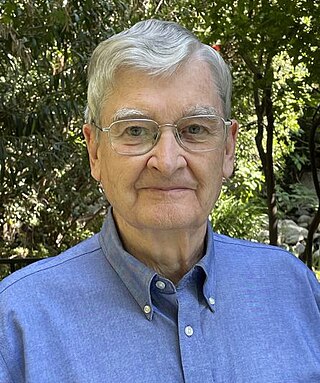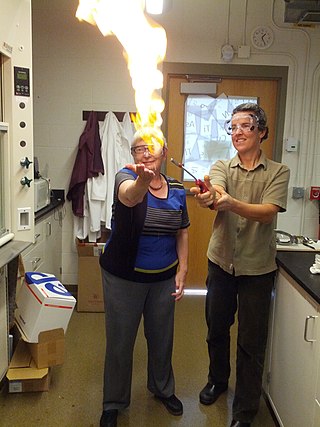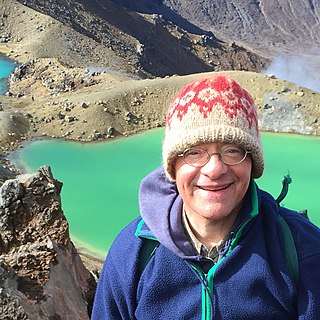Related Research Articles
William Sefton Fyfe, was a New Zealand geologist and Professor Emeritus in the department of Earth Sciences at the University of Western Ontario. He is widely considered among the world's most eminent geochemists.

Don Lynn Anderson was an American geophysicist who made significant contributions to the understanding of the origin, evolution, structure, and composition of Earth and other planets. An expert in numerous scientific disciplines, Anderson's work combined seismology, solid state physics, geochemistry and petrology to explain how the Earth works. Anderson was best known for his contributions to the understanding of the Earth's deep interior, and more recently, for the plate theory hypothesis that hotspots are the product of plate tectonics rather than narrow plumes emanating from the deep Earth. Anderson was Professor (Emeritus) of Geophysics in the Division of Geological and Planetary Sciences at the California Institute of Technology (Caltech). He received numerous awards from geophysical, geological and astronomical societies. In 1998 he was awarded the Crafoord Prize by the Royal Swedish Academy of Sciences along with Adam Dziewonski. Later that year, Anderson received the National Medal of Science. He held honorary doctorates from Rensselaer Polytechnic Institute and the University of Paris (Sorbonne), and served on numerous university advisory committees, including those at Harvard, Princeton, Yale, University of Chicago, Stanford, University of Paris, Purdue University, and Rice University. Anderson's wide-ranging research resulted in hundreds of published papers in the fields of planetary science, seismology, mineral physics, petrology, geochemistry, tectonics and the philosophy of science.

The Mineralogical Society of America (MSA) is a scientific membership organization. MSA was founded in 1919 for the advancement of mineralogy, crystallography, geochemistry, and petrology, and promotion of their uses in other sciences, industry, and the arts. It encourages fundamental research about natural materials; supports the teaching of mineralogical concepts and procedures to students of mineralogy and related arts and sciences; and attempts to raise the scientific literacy of society with respect to issues involving mineralogy. The Society encourages the general preservation of mineral collections, displays, mineral localities, type minerals and scientific data. MSA represents the United States with regard to the science of mineralogy in any international context. The Society was incorporated in 1937 and approved as a nonprofit organization in 1959.
Peter John Wyllie is a British petrologist and academic.
Brian Harold Mason was a New Zealand geochemist and mineralogist who was one of the pioneers in the study of meteorites. He played a leading part in understanding the nature of the Solar System through his studies of meteorites and lunar rocks. He also examined and classified thousands of meteorites collected from Antarctica.

George R. Rossman is an American mineralogist and the Professor of Mineralogy at the California Institute of Technology.

Alexandra Navrotsky is a physical chemist in the field of nanogeoscience. She is an elected member of the United States National Academy of Sciences (NAS) and the American Philosophical Society (APS). She was a board member of the Earth Sciences and Resources division of the NAS from 1995 until 2000. In 2005, she was awarded the Urey Medal, by the European Association of Geochemistry. In 2006, she was awarded the Harry H. Hess Medal, by the American Geophysical Union. She is currently the director of NEAT ORU, a primary program in nanogeoscience. She is distinguished professor at University of California, Davis.

Bernard Elgey Leake is an English geologist. He is Emeritus Professor of Geology at the University of Glasgow, was Leverhulme Emeritus Fellow at Cardiff University 2000-2002 and has been an Honorary Research Fellow at Cardiff University since 1997.
Bernard (Bernie) Wood is a British geologist, and professor of mineralogy and senior research fellow at the University of Oxford. He specializes in the thermodynamics of geological systems, using experimental techniques. He is a prominent figure in the field of experimental petrology, having received multiple awards throughout his career and taught at several universities worldwide.

Sir Alexander Norman Halliday is a British geochemist and academic who is the Founding Dean of the Columbia Climate School, and Director of the Earth Institute at Columbia University. He joined the Earth Institute in April 2018, after spending more than a decade at the Department of Earth Sciences at the University of Oxford, during which time he was dean of science and engineering. He is also a professor of Earth and Environmental Sciences at Columbia University.
Konrad Bates Krauskopf was an American geologist, a pioneer in geochemistry, noted for his work in radioactive waste disposal. Krauskopf led expeditions to Mexico, Norway, the Sierra and the Pacific Northwest. Krauskopf was a geology professor at Stanford University, and a member of the National Academy of Sciences.

Rodney Charles Ewing is an American mineralogist and materials scientist whose research is focused on the properties of nuclear materials.

Mark S. Ghiorso is an American geochemist who resides in Seattle, Washington. He is best known for creating MELTS, a software tool for thermodynamic modeling of phase equilibria in magmatic systems.
Craig E. Manning is a professor of geology and geochemistry in the Department of Earth, Planetary, and Space Sciences at the University of California, Los Angeles, where he served as department chair between 2009 and 2012. Manning's research interests include water chemistry, thermodynamics, gas chemistry, geochemistry, igneous petrology, and metamorphic petrology.
Donald Bruce Dingwell is a Canadian geoscientist who is the director of the Department of Earth and Environmental Sciences and Ordinarius for Mineralogy and Petrology of the Ludwig Maximilian University of Munich. He is also currently vice-president of the Academia Europaea. From September 2011 to December 2013 he was the third and last secretary general of the European Research Council (ERC) where he embarked on a global participation campaign for the ERC. He is also a past-President of the European Geosciences Union and the current past-president of the International Association of Volcanology and Chemistry of the Earth's Interior (IAVCEI), founded in 1919.
Hans Peter Eugster was a Swiss-American geochemist, mineralogist, and petrologist.
Stanley Robert Hart is an American geologist, geochemist, leading international expert on mantle isotope geochemistry, and pioneer of chemical geodynamics.
James Burleigh Thompson Jr. was an American mineralogist and geologist. He was known for his research into the thermodynamics of minerals and the relationship to structure. He introduced the term polysomatic series for describing layered structures with chemically distinct layers.
Charles Thompson Prewitt was an American mineralogist and solid state chemist known for his work on structural chemistry of minerals and high-pressure chemistry.
References
- ↑ "W Gary Ernst". Stanford University. Retrieved December 14, 2015.
- ↑ "W Gary Ernst". Carnegie Institution for Science. Retrieved December 14, 2015.
- ↑ "2004 Penrose Medal". Geological Society of America. Retrieved December 14, 2015.
- ↑ Wyllie, Peter J. (2007). "Presentation of the Roebling Medal for 2006 of the Mineralogical Society of America to W. Gary Ernst" (PDF). American Mineralogist. 92 (5–6): 977–978. Bibcode:2007AmMin..92..977W. doi:10.2138/am.2007.482 . Retrieved September 29, 2017.
- ↑ Ernst, W. G. (2007). "Acceptance of the Roebling Medal for 2006 of the Mineralogical Society of America to W. Gary Ernst" (PDF). American Mineralogist. 92: 979. doi:10.2138/am.2007.481 . Retrieved September 29, 2017.
- ↑ "2008 Recipient of the Marcus Milling Legendary Geoscientist Medal" (PDF). American Geosciences Institute. Retrieved December 14, 2015.
- ↑ "APS Member History". search.amphilsoc.org. Retrieved December 21, 2021.